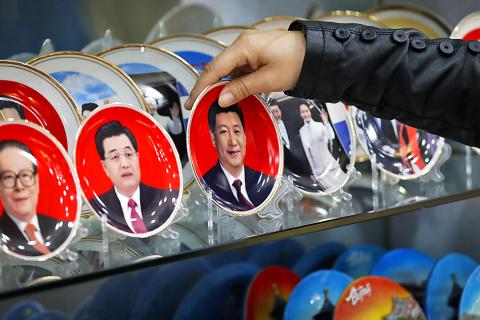Hailing “Mighty Uncle Xi” (習大大), Chinese have taken to social media to welcome Chinese President Xi Jinping’s (習近平) naming by the Chinese Communist Party (CCP) as its “core,” despite party efforts to limit a cult of personality.
Following a four-day plenum, the party late on Thursday gave Xi the title “core,” putting him on par with former Chinese presidents Mao Zedong (毛澤東) and Deng Xiaoping (鄧小平), though it also signaled his power would not be absolute by underscoring the importance of collective leadership.
While a cult of personality had begun to form around Xi, he has moved to stop practices, including adoring songs on the Internet and references to him in state media as “uncle Xi,” sources with ties to the leadership said.

Photo: AP
Indeed, the party’s lengthy communique after the plenum said “boasting” about leaders should be banned and all publicity about them based on fact.
The message has seemingly been lost on enthusiastic users of social media services, where posts about Xi praising him as “Mighty Uncle Xi” — echoing an expression used to greet an emperor — have appeared, despite online censorship blocking searches for the expression.
“With Uncle Xi as the party’s core, our Chinese dream will definitely be realized,” wrote one user, referring to a broad, vaguely defined policy of Xi’s to build a strong and prosperous nation.
The Global Times tabloid, published by the party’s official People’s Daily, said Xi’s role as the core “in fact has long been in the minds of the Chinese people.”
“All Chinese know clearly that the Xi’s leadership has played a critical role in the changes in China in the past four years,” it said in an editorial, pointing to the success of his fight against corruption and in tackling issues like terrorism.
Dozens of senior officials have been jailed in the campaign against graft.
Xi has warned the problem is so severe it could affect the party’s grip on power.
That has made him immensely popular with ordinary Chinese, even if people who spoke in a traditional alleyway not far from the Zhongnanhai leadership compound were not entirely sure what the term “core” meant.
“He’s done things the other leaders could not do, and that’s fighting corruption,” 40-year-old deliveryman Wang Hui said, adding that he had not seen any news about the plenum the night before.
For housewife Cui Huiping, Xi is simply a charmer.
“He’s so handsome. Such manly charm. It’s very attractive,” she said.

FREEDOM OF NAVIGATION: The UK would continue to reinforce ties with Taiwan ‘in a wide range of areas’ as a part of a ‘strong unofficial relationship,’ a paper said The UK plans to conduct more freedom of navigation operations in the Taiwan Strait and the South China Sea, British Secretary of State for Foreign, Commonwealth and Development Affairs David Lammy told the British House of Commons on Tuesday. British Member of Parliament Desmond Swayne said that the Royal Navy’s HMS Spey had passed through the Taiwan Strait “in pursuit of vital international freedom of navigation in the South China Sea.” Swayne asked Lammy whether he agreed that it was “proper and lawful” to do so, and if the UK would continue to carry out similar operations. Lammy replied “yes” to both questions. The

SECOND SPEECH: All political parties should work together to defend democracy, protect Taiwan and resist the CCP, despite their differences, the president said President William Lai (賴清德) yesterday discussed how pro-Taiwan and pro-Republic of China (ROC) groups can agree to maintain solidarity on the issue of protecting Taiwan and resisting the Chinese Communist Party (CCP). The talk, delivered last night at Taoyuan’s Hakka Youth Association, was the second in a series of 10 that Lai is scheduled to give across Taiwan. Citing Taiwanese democracy pioneer Chiang Wei-shui’s (蔣渭水) slogan that solidarity brings strength, Lai said it was a call for political parties to find consensus amid disagreements on behalf of bettering the nation. All political parties should work together to defend democracy, protect Taiwan and resist

By refusing to agree spending increases to appease US President Donald Trump, Spanish Prime Minister Pedro Sanchez threatened to derail a summit that NATO Secretary-General Mark Rutte needs to run smoothly for the sake of the military alliance’s future survival. Ahead of yesterday’s gathering in The Hague, Netherlands, things were going off the rails. European officials have expressed irritation at the spoiler role that Sanchez is playing when their No. 1 task is to line up behind a pledge to raise defense spending to 5 percent of GDP. Rutte needed to keep Spain in line while preventing others such as Slovakia

SHIFT PRIORITIES: The US should first help Taiwan respond to actions China is already taking, instead of focusing too heavily on deterring a large-scale invasion, an expert said US Air Force leaders on Thursday voiced concerns about the Chinese People’s Liberation Army’s (PLA) missile capabilities and its development of a “kill web,” and said that the US Department of Defense’s budget request for next year prioritizes bolstering defenses in the Indo-Pacific region due to the increasing threat posed by China. US experts said that a full-scale Chinese invasion of Taiwan is risky and unlikely, with Beijing more likely to pursue coercive tactics such as political warfare or blockades to achieve its goals. Senior air force and US Space Force leaders, including US Secretary of the Air Force Troy Meink and